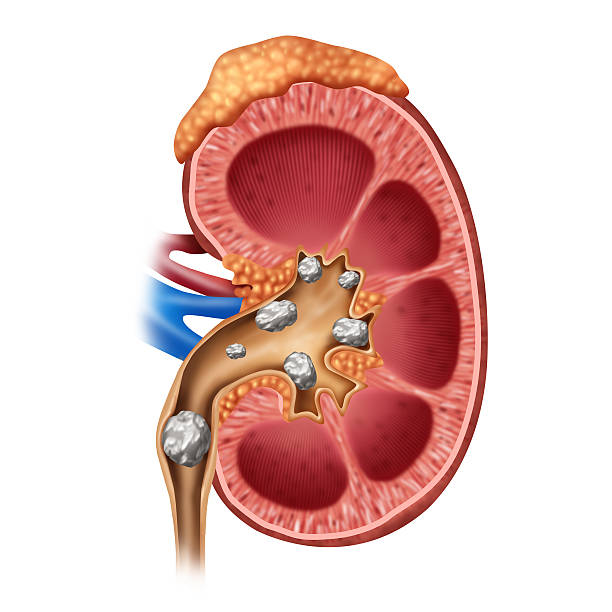Kidney stones are also called renal calculi
. They are hard deposits made of minerals and salts that form inside your kidneys. Diet, excess body weight, some medical conditions, and certain supplements and medications are among the many causes of kidney stones. Kidney stones can affect any part of your urinary tract from your kidneys to your bladder. Often, stones form when the urine becomes concentrated, allowing minerals to crystallize and stick together.
What are kidney stones? How can they harm you? A kidney stone usually will not cause symptoms until it moves around within your kidney or passes into your ureters the tubes connecting the kidneys and the bladder. If it becomes lodged in the ureters, it may block the flow of urine and cause the kidney to swell and the ureter to spasm, which can be very painful. At that point, you may experience these signs and symptoms like severe, sharp pain in the side and back, below the ribs. Pain that radiates to the lower abdomen and groin or that comes in waves and fluctuates in intensity. Sometimes it has a burning sensation while urinating.
Some other signs and symptoms may include pink, red or brown urine, cloudy or foul-smelling urine. Or a persistent need to urinate, urinating more often than usual or urinating in small amounts. Nausea and vomiting are other symptoms. Fever and chills if an infection is present. Pain caused by a kidney stone may change, for instance, shifting to a different location or increasing in intensity as the stone moves through your urinary tract.
What are kidney stones? What do they look like? Kidney stones often have no definite, single cause, although several factors may increase your risk. Kidney stones form when your urine contains more crystal-forming substances — such as calcium, oxalate and uric acid — than the fluid in your urine can dilute. At the same time, your urine may lack substances that prevent crystals from sticking together, creating an ideal environment for kidney stones to form.
Different kinds of kidney stones can harm your body. Knowing the type of kidney stone you have helps determine its cause, and may give clues on how to reduce your risk of getting more kidney stones.
Calcium stones – Most kidney stones are calcium stones, usually in the form of calcium oxalate. Oxalate is a substance made daily by your liver or absorbed from your diet. Certain fruits and vegetables, as well as nuts and chocolate, have high oxalate content.
Dietary factors, high doses of vitamin D, intestinal bypass surgery and several metabolic disorders can increase the concentration of calcium or oxalate in urine. Calcium stones may also occur in the form of calcium phosphate. This type of stone is more common in metabolic conditions, such as renal tubular acidosis. It may also be associated with certain medications used to treat migraines or seizures, such as topiramate.
Struvite stones – Struvite stones form in response to a urinary tract infection. These stones can grow quickly and become quite large, sometimes with few symptoms or little warning.
Uric acid stones – Uric acid stones can form in people who lose too much fluid because of chronic diarrhoea or malabsorption, those who eat a high-protein diet, and those with diabetes or metabolic syndrome. Certain genetic factors also may increase your risk of uric acid stones.
Cystine stones – These stones form in people with a hereditary disorder called cystinuria that causes the kidneys to excrete too much of specific amino acid.
If someone in your family has had kidney stones, you’re more likely to develop stones, too. If you’ve already had one or more kidney stones, you’re at increased risk of developing another. Not drinking enough water each day can increase your risk of kidney stones. People who live in warm, dry climates and those who sweat a lot may be at higher risk than others. Eating a diet that’s high in protein, salt and sugar may increase your risk of some types of kidney stones. Obesity, digestive diseases and surgery are some of the most common risk factors that are associated with kidney stones.


8 Comments
Pingback: What are Kidney Stones? – Sujata Birla Hospital
Pingback: What causes kidney diseases? | Sujata Birla Hospital
Pingback: Why does abdominal pain happen? | Sujata Birla Hospital
Pingback: Health Benefits of Spinach | Birla Healthcare
Pingback: White Vegetables and Their Benefits | Diet |Birla Hospital
Pingback: Signs of Kidney Disease | Sujata Birla Hospital
Pingback: Kidney Stones: Causes & Symptoms | Sujata Birla Hospital
Pingback: UTIs in Adults | Sujata Birla Hospital